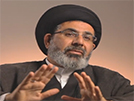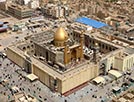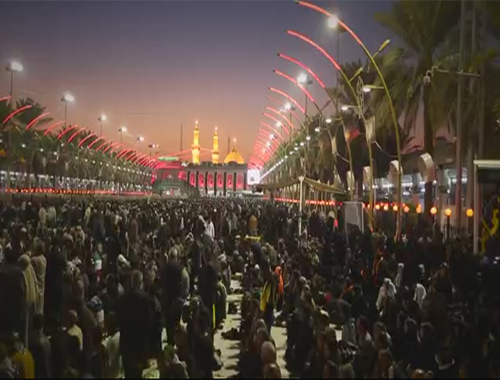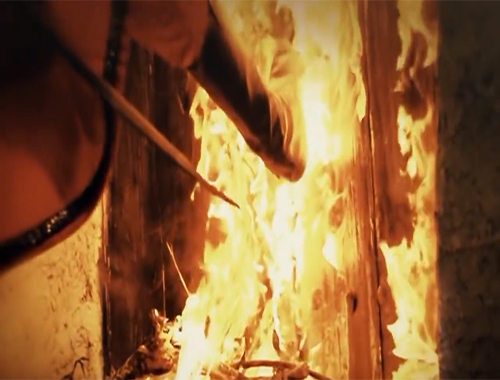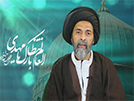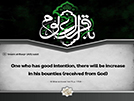The Personality of Imam
- Details
- Hits: 9146
The Personality of Imam
His Worship
His Prayer
In his prayer, he turned with all his heart and feelings towards Allah the Creator of the universe and the Giver of life. He felt or paid attention to nothing of the affairs of this life while he was in prayer. His soul clung to Allah devotedly and totally.
His Qunut[2]
In his prayer, Imam Abu Muhammad (AS) recited this du’a,
“O You, Whose light covers darkness, O You, by Whose holiness rugged mountain passes are lit, O You, to Whom all the inhabitants of the earth and the heavens submit, O You, to Whom every insolent tyrant surrender with obedience, O You the Aware of hidden consciences, You are Merciful to everything and Aware of everything, forgive those who repent and follow Your path, protect them from the torment of Fire, give them soon Your victory that You have promised them of and You do not fail the promise! Devastate the people of evil and take them to the worst abode in the worst punishment and the ugliest retreat.
O Allah, You know the secrets of creatures, and are aware of their consciences. You are in need of nothing except that You carry out what You have promised of. You do not uncover the hidden secrets of Your people. O my Lord, You know what I conceal and what I show of my behaviors, movements, and all my emotions. O my Lord, You see the sufferings of the people of Your obedience and what they meet from Your enemies, and You are generous and not stingy in Your blessings, and the more efforts require more reward. You have ordered Your people of supplication if they turn to You sincerely and this requires the more of Your favors.
These forelocks and necks are submissive to You subserviently acknowledging Your deity, invoking on You with their hearts, and looking forward to Your prompt rewarding, and what You willed took place and what You will shall take place. You are the called upon, the hoped for, and the asked that no taker whatever great he is shall decrease You(r favors), and no asker whatever he insists and invokes shall weary You. Your kingdom shall not come to an end, and Your eternal glory shall remain forever, and nothing in the ages is out of Your will a bit.
You are Allah, there is no god but You the Merciful, the Mighty. O Allah, assist us by Your assistance, suffice us with Your protection, and give us what You give those who hold fast by Your rope, who shade themselves under Your shade…’[3]
His Du’a In The Morning
“O You, the greater than every great, Who have no partner and no vizier, O You, the Creator of the sun and the lighting moon, the shelter to the resorting fearful, the Liberator of tied captives, the nourisher of young babies, the setter of broken bones, the Merciful to the old, the light of light, the Manager of affairs, the Resurrector of those in graves, the Healer of chests, the Maker of shadow and hot, the Aware of all in chests, the Revealer of the Book, light, the great Qur'an, and the Book of Psalms, O You, Whom angels glorify in the morning and night, O You, the Permanent and Eternal, the Bringer forth of plants in the early morning and afternoon, the Enlivener of the dead, the Resurrector of decayed bones, the Hearer of sounds, the Everlasting, the Dresser of bones that decay after death!
O You, Whom nothing distracts from any other thing, Who do not change from a state to another, Who do not need to move or advance, Whom no affair prevents from any other affair, Who cancel for charity and supplication what has been determined and affirmed in the Heaven of bad judgment, Whom no place can include or encompass, Who put remedy in what You like of things, Who keep alive from serious disease with the least of nourishment, Who remove by the least of remedy the worst of diseases, O You, Who if promise, carry out, if threaten, pardon,
O You, Who possess the needs of requesters, Who know what is there inside the consciences of the silent, O You, the Most Magnificent, the Generous in pardoning, O You, Who have a face that does never become old, Who have infinite sovereignty, Who have inextinguishable light, Whose throne is over everything, Whose authority is over the land and the sea, Whose wrath is in the Hell, Whose mercy is in the Paradise, Whose promises are true, Whose favors are uncountable, Whose mercy is wide, O You, the Helper of the callers for help, the Responder to the call of the compelled,
O You, Who are in the high view and Your creation is in the low view, O You, the Lord of the mortal souls, the Lord of the worn bodies, the most perceptive of seers, the most hearing of hearers, the promptest of accounters, the wisest of judges, the Most Merciful of the merciful, the Giver of gifts, the Releaser of captives, the Lord of glory, the One of piety and forgiveness, O You, Whose limit cannot be perceived, Whose number cannot be counted, Whose aid does not cease,
I bear witness, and the witness to me is honor and supply, and from me obedience and submission, and by which I hope deliverance on the day of sigh and regret, that You are Allah; there is no god but You alone with no partner, and that Muhammad is Your slave and messenger, Your blessing be on him and on his progeny, and that he has informed and carried out on behalf of You what was his duty to You, and that You always create, provide with livelihood, give, deny, exalt, humble, enrich, impoverish, disappoint, help, pardon, show mercy, forgive, overlook what You know, do not wrong, straiten, enlarge, omit, fix, initiate, reproduce, enliven and make die; have mercy on Muhammad and the progeny of Muhammad and guide me from You, give me from Your favor, spread on me from Your mercy, and send down to me from Your blessings, for You often have accustomed me to good and favor, given me too much, and uncovered my ugly deeds.
O Allah, have blessings on Muhammad and the progeny of Muhammad and hasten my deliverance, forgive my slips, pity my loneliness, take me to the best of Your worships, gift me with healthiness from my illness, plenty of my supplies, inclusive soundness in my body, insight in my religion, and help me to ask you for forgiveness before death comes and hoping stops, and help me bear death and its distress, grave and its loneliness, the scales and their lightness, the sirat[4] and its slip, the Day of Resurrection and its terror.
I ask You for the acceptance of deeds before death, and ask You for strength in my hearing and sight for the doing of the best of that You have taught and made me understand. You are the lofty Lord, and I am the humble slave, and how great difference there is between us! O You, Compassionate, Benefactor, of Glory and Honor, have blessings on Muhammad and the progeny of Muhammad the good, the pure!”[5]
His Ideals
He was ideal in faith, morals, and psychology. He inherited all the perfections of his fathers who had been created for virtue and honor. We refer here to some of his perfections:
His Knowledge
Historians unanimously mentioned that Imam Abu Muhammad al-Askari (AS) was the most knowledgeable and the best of the people of his age, not only in the religious affairs and laws but in all fields of knowledge. Bakhtshou’ the Christian physician said to his disciple Batriq about the imam, ‘…and he is the most knowledgeable of all those under the sky in our day.’[6]
If the Abbasid tyrants had given way to the imams of the Ahlul Bayt (AS) and not subjected them to strict chase and confinement, they would have filled the world with their knowledge and sciences, and humanity would have got kinds of knowledge and intellectual development that it had never got throughout all ages and times.
The Abbasids perceived that if they did not prevent the people of knowledge and intellect from associating with the infallible imams, they (the imams) would spread powers of knowledge and culture and open new horizons not only in the fields of sciences but also in the political and social fields which would show to people the ignorance of the Abbasids and their being away from the Islamic values. Of course, this would shake their thrones, and therefore they tried their best to separate between the nation and its real leaders.
His Patience
Imam al-Askari (AS) was from the most patient people. He always suppressed his anger and treated whoever did him wrong with kindness and forgiveness.
The Abbasid government arrested and put him into prison while he was patient saying nothing. He did not complain to anyone about what he suffered, but he entrusted his case to Allah the Almighty. This was from the signs of his patience.
His Strong Will
Imam Abu Muhammad (AS) was distinguished by his strong will. The Abbasid rulers tried to involve him into the government body and spared no effort to subject him to their desires, but they failed. The imam (AS) insisted on his independency and keeping away from them. The Abbasids considered him as the only representative of the opposition against their policies that were based on subjugation and oppression.
He resisted all the seductions that the Abbasid government offered to bring him into its way. He preferred the obedience of Allah and the satisfaction of his conscience to everything else.
His Generosity
No one was more generous than him among all people of his time. He appointed agents in most of the Muslim countries, and entrusted them to receive the legal dues and spend them on the poor and the deprived, to reconcile between people, and in other ways of the general welfare.
From that which historians mentioned about his generosity was that Muhammad bin Ali bin Ibrahim bin Imam Musa bin Ja’far al-Kadhim said, “We were in utmost need. My father said, ‘Let us go to this man (Imam Abu Muhammad). It is said he is generous.’
I said, ‘Do you know him?’
He said, ‘No, and I have never seen him at all.’
We went to him. On our way, my father said, ‘How much we need that he may order to give us five hundred dirhams; two hundred for clothes, two hundred for flour, and one hundred for spending!’
I said with myself, ‘Would that he order to give me three hundred dirhams; one hundred to buy a donkey, one hundred for spending, and one hundred for clothes so that I can go to the mountain!’
When we stopped at his (Imam Abu Muhammad’s) door, his servant came out and said, ‘Let Ali bin Ibrahim and his son Muhammad come in!’
When we came in and greeted him, he said to my father, ‘O Ali, what made you not visit us all this time?’
My father said, ‘I felt shy to meet you in this case.’
They (Ali and his son) stayed with the imam for some time and then came out. The servant of the imam came, gave Ali bin Ibrahim a pouch of money and said, ‘These are five hundred dirhams; two hundred for clothes, two hundred for flour, and one hundred for spending.’ He gave Muhammad a pouch of three hundred dirhams and said to him, ‘Make one hundred for buying a donkey, one hundred for clothes, and one hundred for spending, and do not go to the mountain but go to Sawra!’ Muhammad went to Sawra and became one of the wealthy Alawids.[7]
Abu Hashim al-Ja’fari said, ‘Once, I complained to Abu Muhammad the distress of imprisonment and the pains of ties. He wrote to me, ‘You shall offer the Dhuhr (noon) Prayer in your house today.’ I was set free (from prison) at noon and I offered the prayer in my house as the imam said. I was in need and I wanted to ask him for help (but I did not) in the letter I had sent to him. When I arrived in my house, he sent one hundred dinars to me and wrote to me, ‘If you need something, do not feel shy or refrain from asking. Ask and you shall get what you like inshallah.’[8]
Historians mention many stories on his generosity showing his love and kindness to the poor and the deprived.
High Morals
Imam Abu Muhammad (AS) was nonesuch in his very high morals. He met friends and enemies with his noble character. He inherited this nature from his great grandfather the Prophet (AS) whose high morals included all people.
His high morals affected his enemies and opponents, and they turned to be his loyal lovers. Historians say that he was imprisoned during the reign of al-Mutawakkil who was the bitterest enemy to the Ahlul Bayt (AS) and the progeny of Imam Ali (AS). The caliph ordered the imam to be punished too severely, but when he communicated with the imam and saw his high morality and piety, he turned upside down. After that, he did not raise his eyes before the imam as a kind of respect and glorifying. When the imam left him, he praised the imam with the best words.[9]
Notes :
[1] Dala’il al-Imama, p.227.
[2] Qunut is a supplication recited in the prayer.
[3] Muhaj ad-Da’awat, p.62-63.
[4] Sirat means “way” or “path” but in the Islamic terminology, it means the bridge that dominates the Hell.
[5] Muhaj ad-Da’awat, p.277-278.
[6] Bihar al-Anwar, vol.50 p.261.
[7] Kashf al-Ghummah, vol.3 p.200.
[8] Kashf al-Ghummah, vol.3, 202.
[9] Kashf al-Ghummah, vol.3 p.204.
Taken from : The Life Of Imam Al-Hasan Al-Askari Study And Analysis By: Baqir Shareef al-Qurashi Translation by: Abdullah al-Shahin


